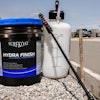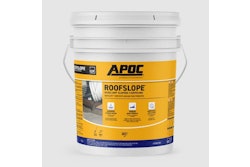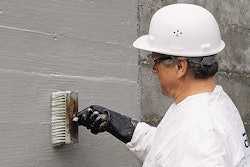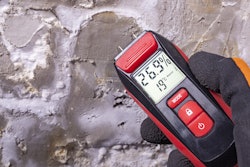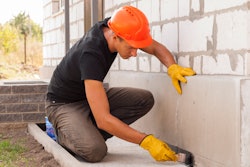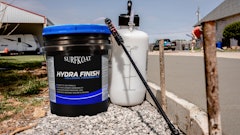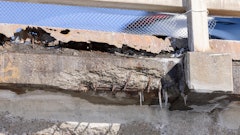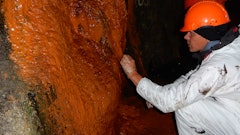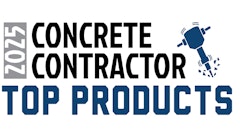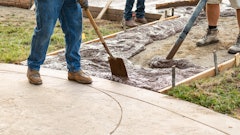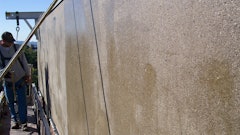Concrete contractors are always looking for ways to make their businesses more profitable. One service that might be a good fit for contractors who install foundation walls and basements is waterproofing.
Getting started
There are two basic types of waterproofing materials: sheet membranes and sprays, including polymers and elastomeric. A contractor will typically use only one of these waterproofing systems. In deciding between them, contractors need to consider the initial cost of the equipment required to do the work and how long it will take to learn excellent waterproofing techniques.
The up-front costs for installing sheet membranes are negligible. The only special equipment needed is a linoleum roller. This roller is used to install the membrane by pressing it firmly against the concrete wall. An angle grinder is also needed to smooth and clean the wall during the preparation process to remove any protrusions from the concrete, but this is a tool most concrete contractors already own. Other equipment includes roller covers, brushes, knives and scrapers, which most contractors have on hand as part of normal concrete work.
Getting started with sprayed-on waterproofing is more costly, but still reasonable. A cube van with a bulk tank inside it equipped with a spray rig, hoses and nozzles can be a good start. Contractors should also consider ladders to get down into the excavation and personal protective equipment including coveralls, respirators and face shields for protection them from the spray material.
Learning to waterproof
Manufacturers of spray-on waterproofing systems will usually provide one-day training of how to use the system and how to spray the waterproofing product onto walls properly.
If a contractor chooses to use waterproofing membranes, there is generally a learning curve. While it may only take a few days to learn the basics, contractors can expect to not feel completely comfortable until after three to five months. Learning new techniques and observing how the structure is put together so the junctions will be waterproofed correctly is paramount.
Selling the service
The benefits of waterproofing are the same regardless of the type of product used. They include protecting the foundation or basement walls from vapor or moisture transmission and preventing efflorescence in the concrete. Waterproofing will prohibit mold and stop any water from coming in through cracks. Many people use their basements as lower level living, so it's a simple sell to protect their investment in the finished basement.
Warranties
Part of what sells waterproofing is the warranty. For below-grade jobs, some contractors offer a three-year warranty. While some manufacturers who have their work inspected and approved by the manufacturer give a 10-year manufacturer's warranty. These warranties sometimes vary in length from five-, 10- or 20-year written manufacturer's warranties depending on the additives and layers of protection chosen by the customer.
Preventing damage to the waterproofing
Things that happen on the jobsite after the waterproofing is finished can damage it. The waterproofing can be damaged in the backfill process or the wall can be cracked then and damage the waterproofing. If a contractor doesn’t grade the drainage away correctly, water as the potential to pond and eventually find a way in. Correct landscaping, grading and downspouts are needed. To avoid these problems, waterproofers need to talk to the landscapers, excavators and builders about how they should do their work to prevent problems that could affect the waterproofing. Subs who cut holes in the wall for utility lines may damage membrane waterproofing.
It is recommended to wait 24 hours for the waterproofing product to cure before back-filling to prevent damage. Take caution however, waiting too long to back-fill can damage membrane waterproofing because excessive ultraviolet exposure can cause the upper portion of the membrane to delaminate.
The bottom line
Being able to waterproof concrete foundations makes a concrete contractor more valuable to a home builder or general contractor. Offering a complete package of services saves them money and puts more dollars in the concrete contractor's pocket.
Jean Feingold is a Gainesville, Fla.-based freelance writer who frequently covers concrete and other construction-related topics.



